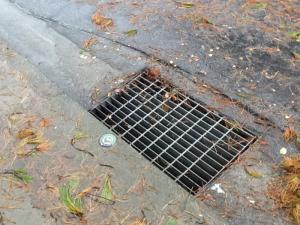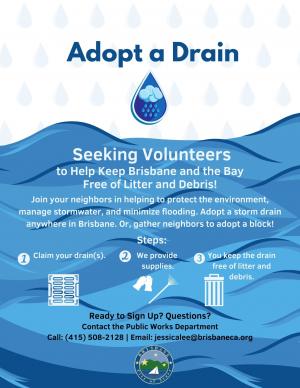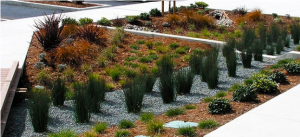NPDES
National Pollutant Discharge Elimination System (NPDES)
What is NPDES?
NPDES is a federal mandate that prohibits pollutants from entering the storm drain system. The NPDES program was created as part of the Federal Clean Water Act Amendments of 1992. The Clean Water Act requires that all local government agencies and major private industries take all practicable measures in reducing pollution discharges into major bodies of water, such as the San Francisco Bay.
The Public Works Department and the Fire Department work together to make sure the City is in compliance with the NPDES permit. Public Works handles the inter-agency liaisons, capital improvement projects relative to permit compliance, public education programs, and administration. The Fire Department serves as first responders for incidents related to run-off, illicit discharges, and hazardous spills.

What is Stormwater?
When it rains, water collects in the streets and travels through the gutters into a catch basin. The stormwater is then transported through underground pipes called storm drains. The water empties from the storm drains and eventually flows out of a pipe and directly into the ocean. Unlike the sewer system, which carries wastewater (sewage) from indoor drains (ie. sink, toilet, and bathtub) to a wastewater treatment plant managed by the CPUC, the storm drain system releases storm water directly into the ocean untreated. The reason for this is simple: when it rains, wastewater treatment plants cannot handle the vast amount of run-off that is created almost instantly. This means that any trash, organic materials, or hazardous chemicals which are dumped in the street can pollute our ocean.

What Can You Do?
Don't Litter: Everything dropped, tossed, spilled, or discarded onto streets and gutters will eventually make its way into the storm drain system - and out to the ocean!
Report Illegal Dumping: Illegal dumping of trash, paint products, motor oil, and other chemicals into storm drains is against the law!
Pick up after your Pets: Animal waste that runs off of lawns and sidewalks sends harmful bacteria into the storm drain system and out into the ocean, creating problems for fish and the ocean's ecosystem.
Safely Handle and Discard Hazardous Waste: Typical household products that should not be disposed of by merely throwing in the trash include items such as unused or leftover paint, pesticides, cleaners, and other chemicals.
Adopt a Drain: Sign up to Adopt a Drain here. The City will provide you with the supplies to help keep the drain free of litter and debris.

What Is the City Doing?
City Hall: At City Hall, a rain garden and bioswale were installed when the building was renovated in 2009.
In town: The City installed bio-retention basins, or bioswales, at three different intersections. - Visitacion & Mariposa, Visitacion & Alvarado, and San Bruno & Santa Clara. These bioswales are filled with a myriad of drought-tolerant plants, and will capture and treat stormwater before it enters the San Francisco Bay.
City landscaping has been done to minimize damage to the Bay and minimize water use, including the use of subsurface irrigation mats.
Brisbane is actively involved in the County Stormwater Pollution Prevention Program, to keep urban runoff that is polluted from flushing into storm drains and discharging into the Bay.
